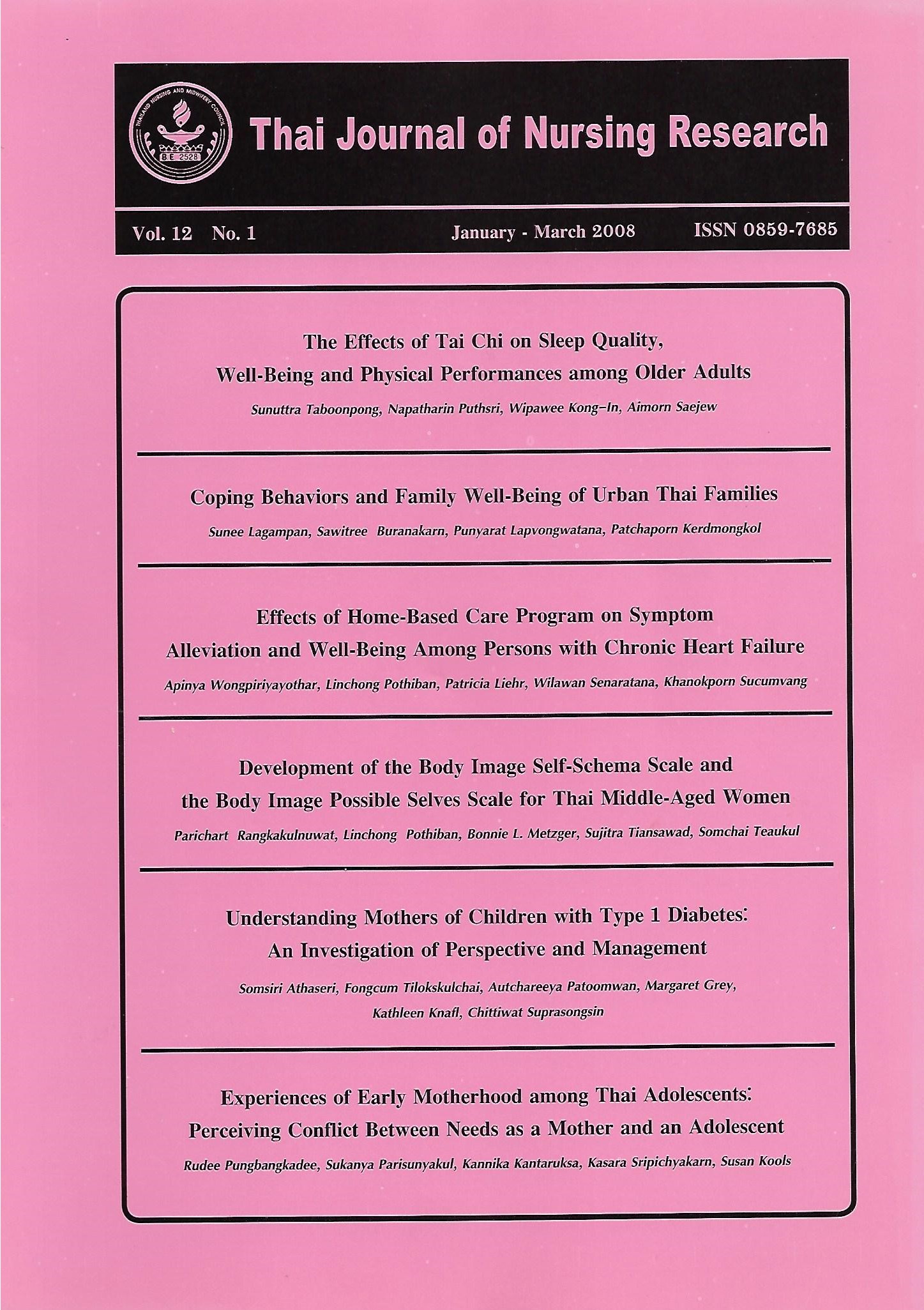Coping Behaviors and Family Well-Being of Urban Thai Families
Keywords:
การเผชิญปัญหา, ความผาสุกในครอบครัว, ครอบครัวไทยเขตเมือง, coping behaviors, family well-being, urban Thai familyAbstract
วัตถุประสงค์ของการวิจัยนี้ เพื่อศึกษาความสัมพันธ์ระหว่างพฤติกรรมเผชิญปัญหา และความผาสุกในครอบครัวไทยเขตเมือง รูปแบบการวิจัยเป็นการวิจัยเชิงพรรณนาหาความ สัมพันธ์โดยประยุกต์ใช้ทฤษฎีความเครียดและการเผชิญความเครียดของลาชาลัส เป็นแนวทางใน การศึกษา กลุ่มตัวอย่างเป็นคู่สามีภรรยาจำนวน 100 ครอบครัว ที่อาศัยในชุมชนเขตเมืองในกรุงเทพมหานคร เลือกเข้ามาเป็นกลุ่มตัวอย่างตามเกณฑ์ที่กำหนด เก็บรวบรวมข้อมูลโดยใช้การ สัมภาษณ์ตามโครงสร้างได้แก่ คำถามด้านสังคมประชากร มาตราวัดพฤติกรรมการเผชิญปัญหา (Jalowiec,1988) และแบบประเมินความผาสุกในครอบครัว (Caldwell,1988)
ผลการวิจัยพบว่า กลุ่มตัวอย่างสามีและภรรยามีพฤติกรรมการเผชิญปัญหาและการรับรู้ ความผาสุกในครอบครัวคล้ายคลึงกัน พฤติกรรมการเผชิญปัญหามีความสัมพันธ์อย่างมีนัยสำคัญ กับความผาสุกในครอบครัวทั้งในกลุ่มสามีและภรรยา ( r = 0.35 และ r =0.30 p<.01 ตามลำดับ) เมื่อนำปัจจัยทางด้านสังคมประชากรมาพิจารณาด้วยพบว่า มีเพียงการเผชิญปัญหาแบบมุ่งแก้ปัญหา และการเผชิญปัญหาแบบใช้อารมณ์ ที่สามารถอธิบายความแปรปรวนความผาสุกในครอบครัว ตามการรับรู้ของสามีได้อย่างมีนัยสำคัญ (R2=0.270 F=17.792 p<.001) และพบว่า การเผชิญปัญหาแบบมุ่งแก้ปัญหา การเผชิญปัญหาแบบใช้อารมณ์ และความเพียงพอของรายได้ครอบครัว สามารถร่วมอธิบายความแปรปรวนความผาสุกในครอบครัวตามการรับรู้ของภรรยาได้อย่างมีนัย สำคัญ ( R2 =0.182 F= 7.142 p<.001) จากข้อคันพบที่ได้เสนอแนะว่าครอบครัวควรได้รับการให้คำปรึกษาและการให้ความรู้ใน การใช้พฤติกรรมการเผชิญปัญหาอย่างเหมาะสม เมื่อต้องเผชิญกับภาวะเครียดต่างๆ ในชีวิต ประจำวัน ทั้งนี้เพื่อส่งเสริมให้เกิดความผาสุกในครอบครัว
This study investigates the relationships between coping behaviors and family well-being of urban Thai families. A descriptive correlational study was guided by the theory of Lazarus’ stress and coping. Samples of 100 families residing in an urban area of one district in Bangkok were recruited by purposive sampling. Data collection was carried out by using interview forms consisting of items on sociodemographics, Coping Behavior Scales, and Family Well-being Assessment (FWA).
The findings reveal that the husbands and wives reported similar coping behaviors and family well-being. There were significant correlations between coping behavior and family well-being for both husbands and wives (r = 0.35 and r = 0.30 at p<.01, respectively), when sociodemographics factors were adjusted, both problem-focused coping and emotional-focused coping could account for the family well-being of the husbands (R2 = 0.270, F = 17.792, p <.001). Similarly, problem-focused coping, emotional-focused coping, and sufficient family income could account for the family well-being of the wives (R2 = 0.182, F = 7.142, p<.001).
The study suggests that family should be counseled and educated to use appropriate coping behaviors when faced with stressful life events for enhancing their family well-being.
References
2. Bernard J. The future of marriage. New Haven, GT: Yale University Press, 1982.
3. Braverman L. The myths of motherhood. In McGoldrick M, Anderson G, Waslh F, eds. Women in family: Framework for family therapy. New York: Norton. 1989:227-243.
4. Department of Mental Health, Ministry of Public Health.Statistic of marriage, divorce, and divorce rate. Retrieved September 6, 2006 from https://www.dmh.go.th/report/status/status.asp?area= %A1%B7%C1&State%a.
5. Kom-chad-luek Daily News on Friday, June 16, 2006. Retrieved September 12, 2006 from https://www.komchadluek.net/2006/06/16a001-19509.php?news_id=19509.
6. Retrieved September 12, 2006 from https://www.judiciary.go.th/jit/research/ detail/suwat_1.doc.
7. Rhachaput Suandusis Institute çSuandusis poll:. Family Day, Case study: Family Break downé during April 10-14, 2006. Retrieved September September 6, 2006 from https://dusipoll.dusit.ac.th./2546/2546_106.html.
8. Caldwell SM. The family well-being assessment tool. In Strickland OL, Dilorio C, eds. Measurement of nursing outcomes: Client outcomes and quality of care. 2nd ed. New York: Springer Publishing Company. 2003: 75-89.
9. Thomas RC. Conceptual foundation for a theoretical model of family well-being. Paper presented at the convention of the Health Communications Division of the International Communication Association, Minneapolis, 1981.
10. Bomar PJ. Promoting health in families: Applying family research and theory to nursing Practice. 3rd ed. Philadelphia: Saunders, 2004.
11. Lazarus RS, Folkman S. Stress appraisal and coping. New York: Springer,1989.
12. Polit D, Hungler BP. Nursing research: Principle and methods. 5th ed. Philadelphia: J.B. Lippincott Company. 1995: 457-458.
13. Jalowiec A. Confirmatory factor analysis of the Jalowiec coping scale. In Waltz CF, Strickland OL, eds. Measurement of nursing outcome: Volume one:measurement of client outcome. New York: Springer Publish Company. 1988: 236-308.
14. Caldwell SM. Measurement family well-being, conceptual model, reliability, validity, and use. In Waltz CF, Strickland OL, eds. Measurement of nursing outcome. New York: Springer Publish Company. 1988: 396-422.
15. Lazarus RS. Evolution of model of stress, coping, and discrete emotion. In Rice VH, eds. Handbook of stress, coping, and health: Implications for nursing research, theory, and practice. Thousand Oaks, California: Sage
Publication. 2000: 195-222.
16. Friedman MM, Bowden VR, Jones EG. Family nursing: Research, theory & practice. 5th ed. New Jersey: Prentice Hall, 2003.
17. Allender JA. Spradley BW. Community health nursing: Promoting and protecting the publicûs health. 6th ed. Philadelphia: Lippincott Williams & Wlikins, 2005.
Downloads
How to Cite
Issue
Section
License
Copyright: The Pacific Rim International Journal of Nursing Research, Thailand Nursing & Midwifery Council has exclusive rights to publish, reproduce and distribute the manuscript and all contents therein.








.png)



